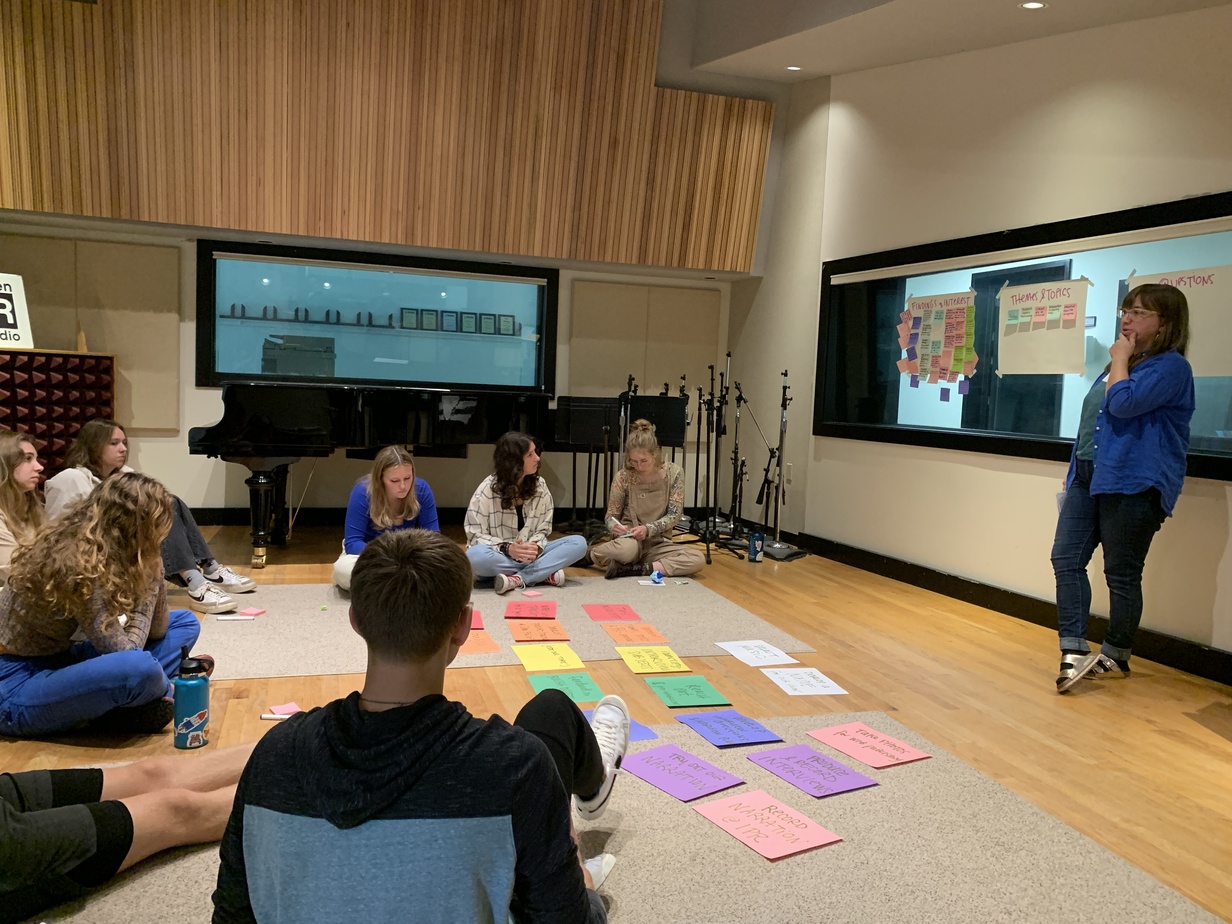
Inside The Student-Led Initiative To Fix The Youth Mental Health Crisis In Northern Michigan
By Craig Manning | Oct. 27, 2023
If there’s a solution to the youth mental health crisis, the kids will probably be the ones to find it.
That philosophy is the guiding principle behind the Youth Wellness Initiative (YWI), hosted by the Grand Traverse Regional Community Foundation (GTRCF), that has convened a team of teenagers to research youth mental health in northern Michigan. While those students are working under the guidance of adults, they are ultimately the ones leading the charge on the YWI project, which has a mission no less ambitious than making northern Michigan a safer and healthier place to grow up.
Both locally and nationally, youth mental health is in the spotlight. An ARPA-funded regional mental health center is on the way for Grand Traverse County, Munson Healthcare has $5 million in state appropriations earmarked “to expand pediatric behavioral health” in northern Michigan, and Traverse City Area Public Schools (TCAPS) will soon open a student health clinic with a major behavioral health component. And on the national level, news broke this week that dozens of attorneys general from across the United States – including Michigan Attorney General Dana Nessel – were suing Facebook parent company Meta for its role in the youth mental health crisis.
Dave Mengebier, president and CEO of GTRCF, sees the YWI project as an important piece of the puzzle. Funded by a $100,000 grant from the Michigan Health Endowment Fund, the initiative convened 14 high school students from across GTRCF’s five-county service area and teamed them up with two experts: Dr. Ashley Drake, a former instructor and researcher at the University of Chicago; and Woody Smith, founder and president of the local market research and strategy firm Avenue ISR. Drake and Smith worked with the students to develop an anonymous survey of their peers, which posed questions about mental health challenges and supports.
“The idea was, rather than adults asking high school students what they thought, why don't we have high school students ask their peers what is causing them a lot of stress?” Mengebier explains. The expectation, he says, was that students might be more candid about their mental health experiences if their classmates were the ones asking the questions.
The strategy worked: 530 students from 20 different high schools responded, and that wealth of data allowed the YWI team to spring into the next phase of their project.
“Once we had the data, the high school students analyzed it, and they came up with 11 recommendations that schools, parents, or other organizations serving youth and families can consider while working to address the crisis around youth mental health,” Mengebier says.
The data showed a few key findings. Beyond confirming that many high school students in the area “are experiencing significant mental wellness challenges…including anxiety and depression,” the survey found that many students still see a stigma around mental health issues and “do not have anyone they would feel comfortable talking to if they were feeling sad, anxious, or hopeless.” Moreover, the survey determined that many students don’t have much awareness of what mental health resources are available to them, either in their schools or out in the community.
Based on those findings, the YWI team came up with 11 recommendations across three primary categories.
First, the group encourages an expanded focus on mental health education in local school districts, with therapists and counselors talking to students about “specific emotional regulation and organizational techniques” starting as early as elementary school.
The second category, “facilitating interactions,” recommends that schools work to facilitate one-on-one connections and discussions around mental health – both between students and counselors and between students and their peers.
Finally, the third category – “using safe spaces and nature to alleviate stress” – advocates for schools to provide environments and situations that might help students “decompress,” whether by designating “chill-out rooms” inside school buildings or putting more of an emphasis on things like field trips and outdoor learning opportunities.
When asked whether she thinks schools or other organizations will take the recommendations to heart, Ellen Grams – one of the 14 students involved – says she’s optimistic. In fact, Grams, a senior at Traverse City Central High School, tells The Ticker she’s already observing significant positive momentum around youth mental health within TCAPS.
“I have definitely seen lots of change from my freshman year,” Grams says, pointing in particular to Trojans Unite, a student-led mental health group that got its start at Central last year. “That group started through Michigan’s Peer-to-Peer Depression Awareness Program, which trains schools throughout the state. I’m the co-president of Trojans Unite, and we have an Instagram account that’s constantly putting out a lot of positive mental health information, from awareness around symptoms to resources that students can access.”
Beyond Trojans Unite, Grams says Central has taken steps to make counselors “a lot more accessible than they were my freshman year,” and has even added a “sanctuary room,” an oasis of beanbag chairs and relaxed energy that offers “a place for kids to calm down.”
“I think it’s just been apparent that more kids are struggling,” Grams says. “And because of that, the administration has been more understanding and more accommodating of kids’ mental health needs.”
Now, students involved in YWI are working on the next phase: a partnership with Interlochen Public Radio where they’ll record, publish, and broadcast a series of podcasts based around what they’ve learned. Per Grams, YWI used survey findings to draft “four big questions” around youth mental health. The team will now produce four podcast episodes, with each one exploring a different one of those key questions.
“It’s questions like, ‘Why do students feel uncomfortable seeking help from counselors?’” Grams says. “And then we’re going to be interviewing a whole bunch of people throughout the community who have experience on the topic and can speak to some of these issues. So, that could be professional psychiatrists, therapists, counselors, even students. And then we’ll be prepping the interviews, conducting the interviews, and putting all that information together into a final podcast episode.”
More details about the podcasts, Grams says, will be announced at a later date. The full “phase 1” YWI survey report, meanwhile, can be found on the GTRCF website.
Pictured: Students involved in YWI mapping out their podcast plans at a recent workshop held at IPR.
Comment






